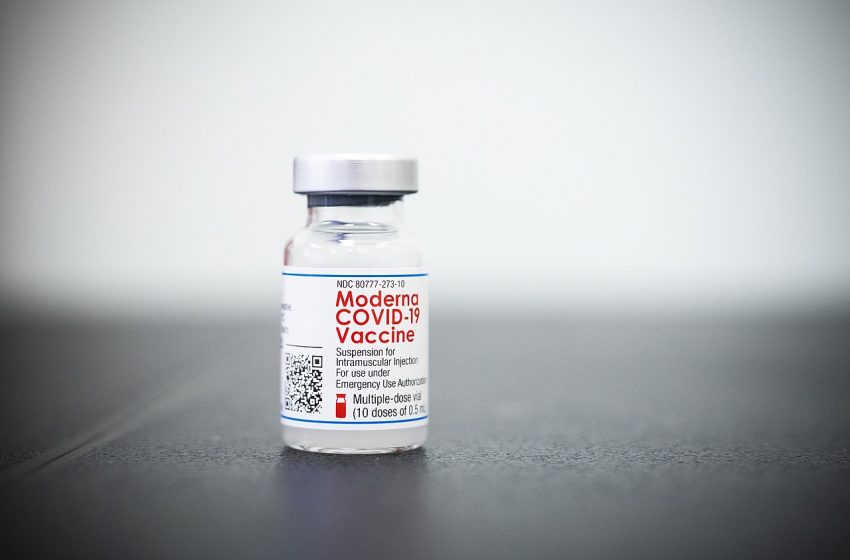The third dose is at the center of the current debate on immunization campaigns in the richest and most advanced countries to protect their citizens from COVID-19. On the one hand, the scientific community mostly agrees that there is still no solid evidence to support the need for a booster shot in the general population. On the other hand, pharmaceuticals are busy publishing data supporting the benefits of a third dose. And governments do not want to be left behind.
Moderna has been the last one, this week, to present results that would support the need to inoculate a booster dose. According to their data, still pending independent review, the effectiveness of two doses of their vaccine decreases 13 months after the first dose. Their study, conducted with people vaccinated with two doses between July and October 2020 (and who participated in their clinical trials, before the vaccine was approved) and participants who had received the full course between December 2020 and March 2021 (once the vaccine was approved), showed an “increased risk of serious infections” among the first group with respect to the second.
This information, according to Moderna, “illustrates the impact of waning immunity and supports the need for a boost to maintain high levels of protection. We hope these findings will be useful as health authorities and regulators continue to evaluate strategies to end this pandemic,” the pharmaceutical company’s statement read.
Nevertheless, the vaccine’s effectiveness against the delta variant, which has been studied in recent months, remains 87% against infection and 96% in preventing hospitalization from the new coronavirus, Moderna added.
Both Moderna and Pfizer, two mRNA vaccine companies, have recently submitted data to the U.S. and European regulatory authorities to advocate for a third dose.
The European Medicines Agency (EMA), for its part, has said that it will make a statement “in the coming weeks” on the data presented by Pfizer, although it has insisted that the effectiveness and duration of protection of the vaccines authorized in the EU remains high against hospitalization, serious illness and death due to COVID-19. In addition, it stresses that one in three adults in the EU over the age of 18 years is still not fully vaccinated, so it urges to prioritize the vaccination of those who have not yet received the two doses.
The companies Pfizer and BioNTech, which developed the most widely used vaccine in Europe, also presented in August the results of their Phase 1 safety and immunogenicity study of the third dose. “The booster dose produced significantly more neutralizing antibodies against SARS-CoV-2 and the beta and delta variants, compared to the levels observed after the first two doses,” they concluded in their statement.
#BREAKING: An advisory panel for the FDA voted to reject a plan to offer booster dose of Pfizer-BioNTech’s COVID-19 vaccine for Americans, saying more data is needed to determine if boosters are safe and effective at this time. https://t.co/CuMz5LnmgP
— FOX 11 Los Angeles (@FOXLA) September 17, 2021
The companies stated that after a booster dose, the neutralizing antibodies against the new variants were similar to the antibodies against the original strain. They therefore recommended administering a third jab six to 12 months after the second dose to maintain protection against COVID-19.
While awaiting the EMA verdict, scientists insist that for the moment there is insufficient evidence to administer booster doses to the general population and argue that to accelerate control of the pandemic it is more urgent to vaccinate at-risk individuals who have not yet received any doses. This was signed by an international panel of experts this week in the magazine The Lancet.
In this regard, the immunologist at the Barcelona Institute for Global Health, Adelaida Sarukhan, stresses that “all the vaccines approved by the EMA (Pfizer, Moderna, AstraZeneca and Janssen) have lost some effectiveness against infection (both symptomatic and asymptomatic) but protection against severe disease, hospitalization and death is still very high, despite the fact that the delta variant is already predominant”.
After analyzing the latest available data, he summarizes that “the one that has a little more effectiveness over time against symptoms is Moderna, followed by Pfizer and then Janssen and AstraZeneca at the same level. In general there is a tendency for AstraZeneca to be slightly less effective against symptoms but not against severe disease. They all continue to show an effectiveness against symptoms above 50%, which is the threshold set by the WHO, and against hospitalization and deaths they all continue to have an effectiveness above 85-90%”. These figures, she recalls, are “extremely high for any other vaccine”, but he considers that for covid-19 “people are asking for miracles”. “We are being very demanding, we have been very lucky with these vaccines,” she concluded.
-Thailand News (TN)





















+ There are no comments
Add yours